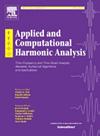基于损失分布的广义GCN更严格的泛化误差界
IF 3.2
2区 数学
Q1 MATHEMATICS, APPLIED
引用次数: 0
摘要
图卷积网络(GCNs)的泛化能力是近年来研究的热点。针对不同的GCN结构,给出了基于算法稳定性的泛化误差界。然而,由于算法稳定性指数依赖于迭代次数,该方法计算的泛化误差界在迭代过程中迅速增大,这与实际GCNs的性能不一致。基于损失格局如凸、expo -凹或Polyak-Lojasiewicz* (PL*)的性质导致更强的稳定性和更好的泛化误差界,本文重点研究了宽GCN的半监督损失格局。结果表明,宽GCN具有一个小范数的Hessian矩阵,可以得到正定的训练切核。那么GCN的损失可以满足PL*条件,并且与之前的工作相比具有更严格的不受迭代影响的均匀稳定性。因此,本文的泛化误差界取决于图滤波器的范数和层数,与实验结果一致。本文章由计算机程序翻译,如有差异,请以英文原文为准。
A tighter generalization error bound for wide GCN based on loss landscape
The generalization capability of Graph Convolutional Networks (GCNs) has been researched recently. The generalization error bound based on algorithmic stability is obtained for various structures of GCN. However, the generalization error bound computed by this method increases rapidly during the iteration since the algorithmic stability exponential depends on the number of iterations, which is not consistent with the performance of GCNs in practice. Based on the fact that the property of loss landscape, such as convex, exp-concave, or Polyak-Lojasiewicz* (PL*) leads to tighter stability and better generalization error bound, this paper focuses on the semi-supervised loss landscape of wide GCN. It shows that a wide GCN has a Hessian matrix with a small norm, which can lead to a positive definite training tangent kernel. Then GCN's loss can satisfy the PL* condition and lead to a tighter uniform stability independent of the iteration compared with previous work. Therefore, the generalization error bound in this paper depends on the graph filter's norm and layers, which is consistent with the experiments' results.
求助全文
通过发布文献求助,成功后即可免费获取论文全文。
去求助
来源期刊

Applied and Computational Harmonic Analysis
物理-物理:数学物理
CiteScore
5.40
自引率
4.00%
发文量
67
审稿时长
22.9 weeks
期刊介绍:
Applied and Computational Harmonic Analysis (ACHA) is an interdisciplinary journal that publishes high-quality papers in all areas of mathematical sciences related to the applied and computational aspects of harmonic analysis, with special emphasis on innovative theoretical development, methods, and algorithms, for information processing, manipulation, understanding, and so forth. The objectives of the journal are to chronicle the important publications in the rapidly growing field of data representation and analysis, to stimulate research in relevant interdisciplinary areas, and to provide a common link among mathematical, physical, and life scientists, as well as engineers.
 求助内容:
求助内容: 应助结果提醒方式:
应助结果提醒方式:


